The Cabinet Secretariat has expanded the jurisdiction of the Directorate of Public Grievances (DPG) to include complaints related to Income Tax and Customs.
This means citizens can now approach the DPG for unresolved grievances concerning the Department of Revenue, specifically the Income Tax Department and the Central Board of Indirect Taxes and Customs (CBIC).
A notification issued by the Cabinet Secretariat confirmed the expansion:
“The jurisdiction of the Directorate of Public Grievances is hereby extended to Department of Revenue (Income Tax) and Central Board of Indirect Taxes and Customs (Customs related issues).”
The DPG operates as an independent grievance redressal mechanism for various Central Government departments and public sector bodies. With this extension, taxpayers and import-export stakeholders who have not received satisfactory resolution through departmental grievance systems now have an additional channel to seek redress.
To file a complaint, citizens must provide detailed information about their grievance along with supporting documents. They must also furnish evidence of prior attempts to resolve the issue through the concerned department’s internal grievance mechanism and disclose whether the matter is currently under appeal before any court, tribunal, or consumer forum. Grievances can be submitted online or offline.
Upon receiving a complaint, the DPG assesses its admissibility and seriousness. If the grievance falls within its jurisdiction, it seeks comments from the relevant department or transfers the complaint for direct handling—usually within 15 working days. The complainant is notified of the action taken. Departments are expected to respond within 30 days. If necessary, the DPG may follow up for further information to ensure fair and objective treatment of the grievance before closing the case.
The DPG already handles grievances related to numerous central departments and agencies such as Indian Railways, India Post, Department of Telecom, CBSE, EPFO, CGHS, Public Sector Banks and Insurance Companies, Passport Authorities, Central Universities, and several others. The addition of Income Tax and Customs marks a significant expansion of its scope.
It’s worth noting that only two officers from the Revenue Department have served in the DPG since its inception: Praveen Mahajan, former Chairperson of the Central Board of Excise and Customs (CBEC), and Rajiv Talwar, former Member of the CBIC. Their experience in revenue matters helped bring tax-related perspectives to the grievance redressal process during their tenures.
However, DPG does not entertain grievances related to policy decisions, matters under litigation, commercial contracts, or service-related issues (except payment of terminal benefits such as gratuity or GPF), nor does it take up frivolous complaints.
This move is expected to improve public trust and administrative accountability by providing a structured and time-bound system for addressing tax and customs-related complaints.

